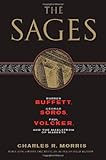Begin forwarded message:
From: delanceyplace <daily@delanceyplace.com>
Date: November 13, 2014 at 03:55:03 EST
To: mseymour@proofmark.com
Subject: nixonomics -- 11/13/14
Reply-To: daily@delanceyplace.com

Today's encore selection -- from The Sages: Warren Buffett, George Soros, Paul Volcker, and the Maelstrom of Markets by Charles R. Morris. U.S. Presidents have had a tendency to pressure the Federal Reserve into keeping interest rates low, and Federal Reserve chairmen are often predisposed to please. But deferring needed rate increases and imposing price controls eventually creates its own undesired consequence:
"Maintaining the gold value of the dollar [by increasing interest rates] conflicted with the Kennedy growth imperative in 1962, although it was finessed by the foreign security tax ploy. Starting about 1965, Lyndon Johnson started running big budget deficits to finance the war in Vietnam and his domestic program [and] the floods of new money were already generating inflationary pressures. ...
"And once again, the prescribed medicine-raise interest rates and reduce borrowing-was not on the table, for it conflicted with Richard Nixon's desire to win a second presidential term.
"The first two years of the Nixon administration were very difficult economic sailing, to the point where the administration was seriously worried about the 1972 election. During the five years of Johnson's presidency, despite the uptick in inflation, the real, or inflation-adjusted, annual rate of growth exceeded 5 percent. But in 1970, growth plunged to near zero, while inflation was scraping 6 percent -- dreadful numbers for a campaign launch. There was little room for maneuver. The 1970 federal deficit was already as big as any Johnson had run, so fiscal stimulation was likely to spill over into more inflation. ...
"But few politicians had Nixon's gift for the bold stroke. In August 1971 he helicoptered his entire economics team to Camp David for a weekend that Herbert Stein, a member of the Council of Economic Advisers, predicted 'could be the most important meeting in the history of economics' since the New Deal. After the meeting, ... Nixon announced that he would cut taxes, impose wage and price controls throughout the economy, impose a tax surcharge on all imports, and rescind the commitment to redeem dollars in gold. ...
"After the final decisions had been taken, [Volcker] was charged with drafting Nixon's and [Treasury Secretary John ] Connally's speeches announcing the changes. His draft, he recalled, was 'a typical devaluation speech' filled with the 'obligatory mea culpas.' None of it saw the light of day. The Volcker draft was handed over to uber speechwriter William Safire and emerged as a proclamation of 'a triumph and a fresh start.'
"Politically, it was a masterstroke. With price controls in place, Nixon and his Federal Reserve chief Arthur Burns could gun up the money supply without worrying about price inflation -- both the narrow and broad measures of money jumped by more than 10 percent in 1971, at the time the biggest increase ever. Economic growth obediently revived and was back up over 5 percent by the 1972 election -- just what the political doctors had ordered.
"Consumers were happy with flat prices, while big business loved the tax breaks, the import surcharges and the price controls. All in a single weekend. Nixon had delivered them from union wage pressures, supplier price hikes, and foreign competition. ...
"Although Nixon got his landslide, the cracks in the economy were too big to hide. The 1971 wage-and-price '90-day freeze' as it was originally billed, lasted for three years. Controls are always easier to put on than to take off. The underlying inflation builds to a point of explosiveness, and the inevitable thicket of rules offers profitable little crevices for the lucky or the well-connected. Organized labor stopped cooperating in 1974, but by then Nixon was deeply ensnared in the coils of Watergate. Congress forced the end of all controls in the spring, except for price controls on domestic oil. Removal of controls triggered double-digit inflation, the first since the 1940s and the country suffered a nasty recession in 1974 and 1975."
 The Sages: Warren Buffett, George Soros, Paul Volcker, and the Maelstrom of MarketsAuthor: Charles R. MorrisPublisher: PublicAffairsCopyright 2009 by Charles R. MorrisPages 124-127
The Sages: Warren Buffett, George Soros, Paul Volcker, and the Maelstrom of MarketsAuthor: Charles R. MorrisPublisher: PublicAffairsCopyright 2009 by Charles R. MorrisPages 124-127
If you wish to read further: Buy Now
If you use the above link to purchase a book, delanceyplace proceeds from your purchase will benefit a children's literacy project. All delanceyplace profits are donated to charity.
Delanceyplace is a brief daily email with an excerpt or quote we view as interesting or noteworthy, offered with commentary to provide context. There is no theme, except that most excerpts will come from a non-fiction work, mainly works of history, are occasionally controversial, and we hope will have a more universal relevance than simply the subject of the book from which they came.
To visit our homepage or sign up for our daily email click here
To view previous daily emails click here.
To sign up for our daily email click here.














No comments:
Post a Comment
No more Anonymous comments, sorry.